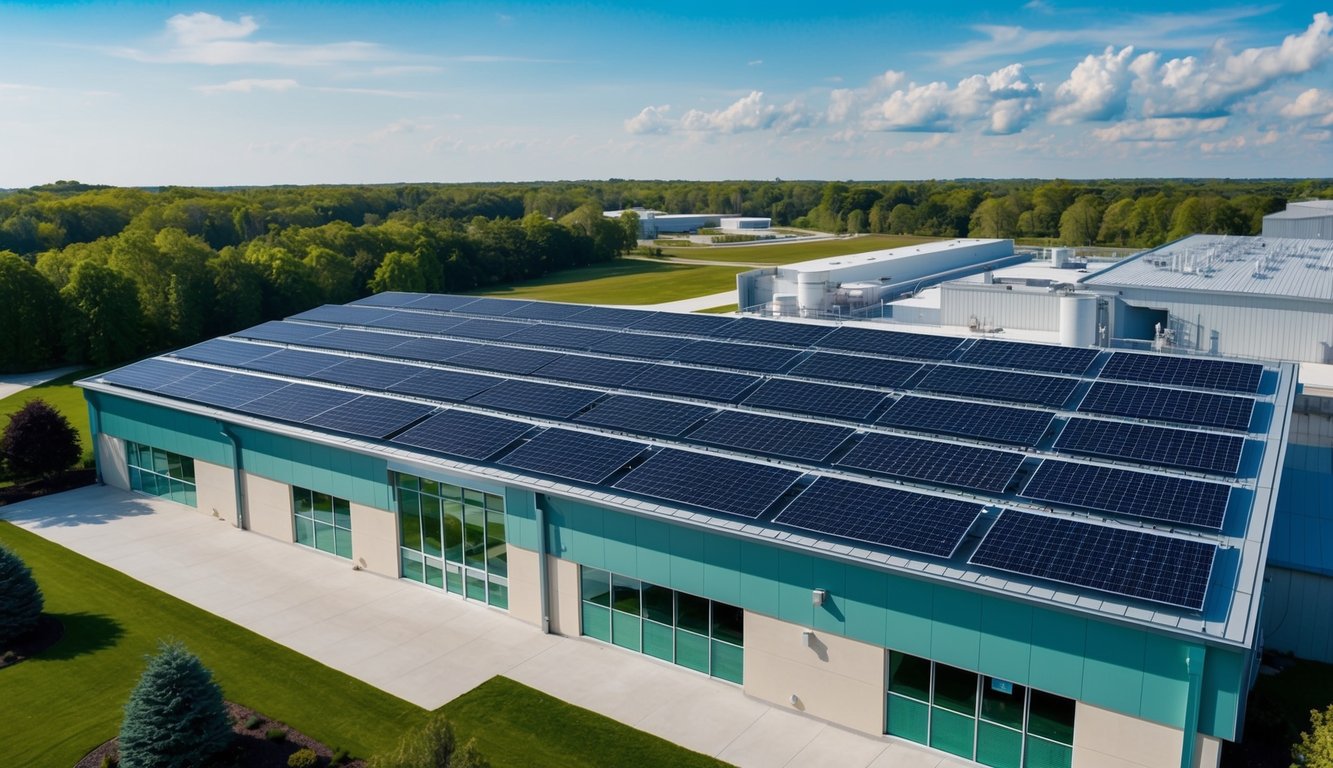Solar Panels for Healthcare & Pharmaceuticals: Powering Medical Innovation
Solar panels offer healthcare facilities and pharmaceutical companies a powerful solution for reducing energy costs and environmental impact. These renewable energy systems can significantly decrease electricity expenses while aligning with sustainability goals in the medical sector. Solar technology has advanced rapidly, making it more efficient and affordable for healthcare institutions of all sizes.
The pharmaceutical industry stands to benefit greatly from solar energy adoption. Many companies in this sector have already begun integrating solar panels into their manufacturing facilities and research centres. This shift not only reduces operational costs but also enhances their reputation as environmentally responsible organisations.
For hospitals and clinics, solar power provides a reliable source of electricity, crucial for maintaining critical equipment and ensuring patient care. The NHS aims to achieve net zero emissions by 2040, with an 80% reduction target by 2032. Installing solar panels on primary care facilities like GP surgeries could save 7,000 tonnes of carbon emissions annually, making a substantial contribution to these ambitious goals.
Key Takeaways
- Solar panels reduce energy costs and environmental impact for healthcare and pharmaceutical facilities
- The NHS targets net zero emissions by 2040, with solar installations playing a crucial role
- Pharmaceutical companies enhance their sustainability profile by adopting solar energy
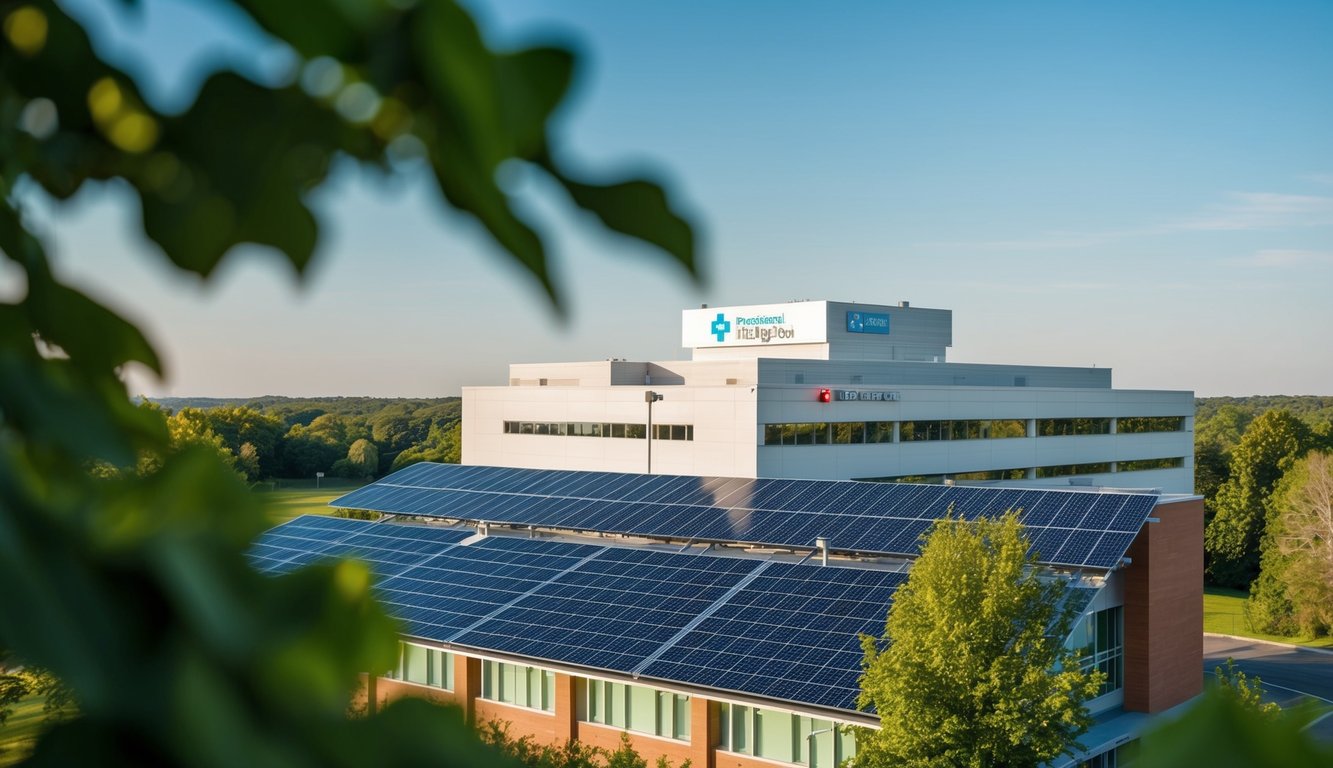
Understanding Solar Energy In Healthcare Settings
Solar energy utilisation in healthcare settings offers substantial benefits for medical facilities. It addresses energy consumption challenges while enhancing operational efficiency and sustainability.
Energy Consumption Patterns In Medical Facilities
Medical facilities have unique energy requirements due to their round-the-clock operations. Hospitals consume vast amounts of electricity for essential equipment, lighting, heating, and cooling systems. Operating theatres, intensive care units, and diagnostic imaging departments are particularly energy-intensive.
Energy usage fluctuates throughout the day, with peak demand often occurring during daylight hours. This aligns well with solar energy generation, making it an ideal supplement to grid power. Large rooftop areas of hospitals provide ample space for solar panel installations, allowing for significant on-site electricity generation.
Benefits Of Solar Power For Healthcare Operations
Solar power offers numerous advantages for healthcare facilities:
- Cost Reduction: Lower electricity bills through on-site generation
- Energy Independence: Reduced reliance on grid power, enhancing resilience
- Environmental Impact: Decreased carbon footprint aligning with sustainability goals
- Reliable Power: Consistent energy supply for critical medical equipment
Solar installations can be coupled with energy storage systems, providing backup power during outages. This ensures continuity of care and protects sensitive medical equipment from power fluctuations.
Current Energy Challenges In The Healthcare Sector
Healthcare facilities face several energy-related challenges:
- Rising Energy Costs: Increasing electricity prices strain hospital budgets
- Ageing Infrastructure: Outdated electrical systems struggle with growing demand
- Power Quality: Sensitive medical equipment requires stable, clean power
- Sustainability Targets: Pressure to reduce carbon emissions and environmental impact
Solar energy solutions address these challenges by providing a clean, renewable power source. They help stabilise energy costs, reduce grid dependence, and support sustainability initiatives. As technology advances, solar adoption in healthcare settings is likely to accelerate, transforming how medical facilities manage their energy needs.
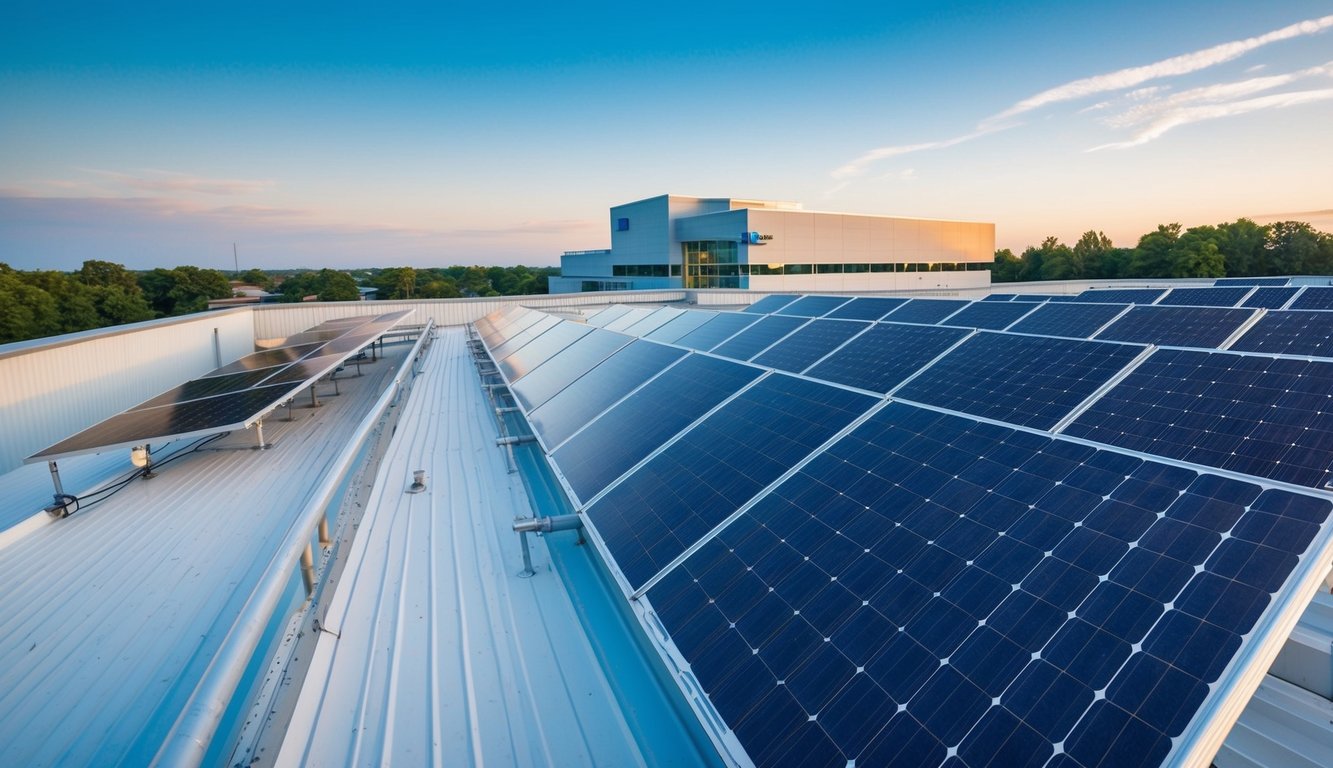
Solar Panel Applications In Medical Facilities
Solar panels offer numerous benefits for medical facilities, providing reliable power and cost savings while supporting critical operations.
Hospital Solar Installation Requirements
Hospitals require specialised solar installations to meet their unique power needs. These systems must be designed to handle high energy demands and integrate seamlessly with existing infrastructure. Key considerations include:
- Roof strength: Structural assessments ensure roofs can support panel weight
- Panel efficiency: High-efficiency panels maximise limited roof space
- Inverter placement: Strategic positioning minimises electromagnetic interference with medical equipment
- Monitoring systems: Real-time monitoring helps optimise energy usage and detect issues quickly
Proper planning and expert installation are crucial for hospital solar projects. Consultations with experienced solar providers familiar with healthcare facilities help ensure compliance with regulations and optimal system performance.
Laboratory Power Management Systems
Laboratories in medical facilities benefit greatly from solar-powered energy management systems. These systems provide:
- Stable power supply: Crucial for sensitive equipment and experiments
- Energy cost reduction: Lowers operational expenses for research facilities
- Backup power integration: Seamless switching to backup sources during outages
Solar panels combined with smart power management solutions help laboratories maintain consistent environmental conditions. This is particularly important for temperature-sensitive materials and long-term studies.
Automated load shedding capabilities can prioritise power to critical equipment during peak usage or limited supply situations. This ensures essential research continues uninterrupted.
Emergency Backup Solutions
Solar panels play a vital role in emergency backup power systems for medical facilities. Key benefits include:
- Extended runtime: Supplements traditional generators for longer outages
- Quiet operation: Reduces noise pollution during emergencies
- Reduced fuel dependence: Decreases reliance on limited fuel supplies
Hybrid solar-battery systems provide a reliable power source for emergency lighting, life support equipment, and communication systems. These solutions can be designed to automatically activate during grid failures, ensuring minimal disruption to critical services.
Regular testing and maintenance of solar backup systems are essential to guarantee their readiness during emergencies.
Temperature-Controlled Storage Units
Solar power systems support temperature-controlled storage units in medical facilities, which are crucial for:
- Vaccine storage: Maintaining precise temperatures for vaccine efficacy
- Medication preservation: Ensuring stability of temperature-sensitive drugs
- Specimen storage: Safeguarding biological samples for research and diagnostics
Solar-powered cooling systems provide reliable temperature control, even during power outages. Smart monitoring solutions alert staff to any temperature fluctuations, helping prevent costly losses of valuable medical supplies.
By reducing energy costs for refrigeration, solar panels allow facilities to allocate more resources to patient care and medical research. The integration of solar power with temperature-controlled storage also supports sustainability goals in healthcare.
Pharmaceutical Manufacturing And Solar Energy
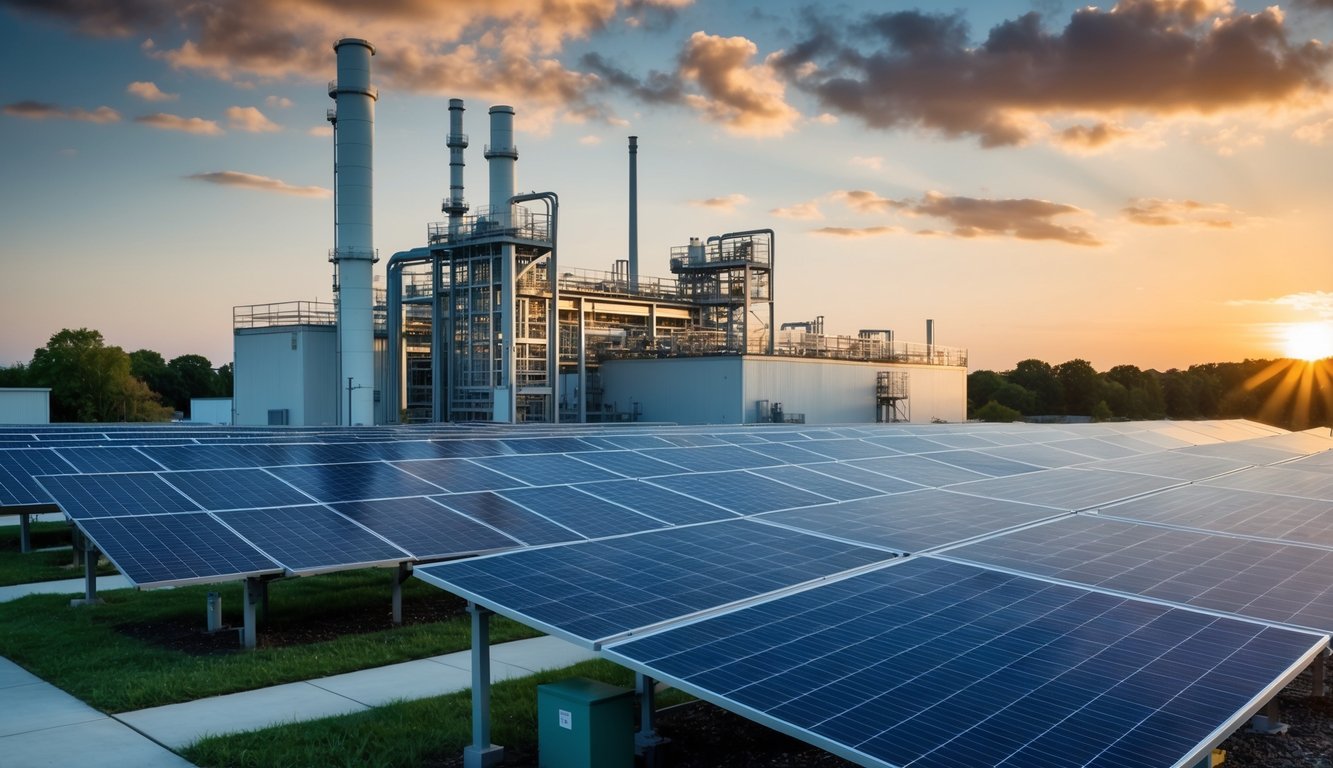
Solar power offers significant advantages for pharmaceutical manufacturing, providing reliable, clean energy to support critical operations. It helps reduce costs while meeting stringent industry requirements.
Clean Room Power Requirements
Clean rooms in pharmaceutical manufacturing require consistent, stable power to maintain controlled environments. Solar energy systems can be designed to meet these exacting needs:
- Voltage stability: Solar inverters provide steady voltage output
- Backup systems: Battery storage ensures uninterrupted power
- Monitoring: Advanced systems track energy usage and quality
Solar installations can be integrated with existing power systems to ensure redundancy. This allows clean rooms to maintain proper air filtration, temperature, and humidity control essential for sterile manufacturing processes.
Quality Control Considerations
Quality control in pharmaceutical manufacturing demands precise, reliable power for sensitive equipment and processes. Solar energy supports these requirements:
Calibration stability: Consistent power prevents equipment drift
Data integrity: Uninterrupted power protects electronic records
Temperature control: Solar cooling systems maintain product stability
Solar power systems can be tailored to match the specific quality control needs of different pharmaceutical operations. This includes providing dedicated power circuits for critical testing equipment and environmental chambers used in stability studies.
FDA Compliance And Power Standards
Solar energy systems for pharmaceutical facilities must adhere to FDA regulations and industry power standards:
- 21 CFR Part 11: Compliant monitoring and data systems
- cGMP guidelines: Power quality meeting manufacturing standards
- Validation: Documented system performance and reliability
Solar installations require thorough qualification and validation to ensure they meet regulatory requirements. This includes designing systems with appropriate fail-safes and documenting their performance in line with FDA expectations for pharmaceutical manufacturing.
Energy-Sensitive Drug Storage
Proper drug storage often requires precise temperature control. Solar power can support these needs:
Cold chain integrity: Solar-powered refrigeration units
Temperature monitoring: Integrated sensors and alarms
Backup power: Battery systems for critical storage areas
Solar energy systems can be designed to prioritise power for temperature-sensitive storage areas. This ensures that valuable pharmaceutical products remain within required temperature ranges even during grid power fluctuations or outages.
Cost Analysis And ROI For Healthcare Solar Systems
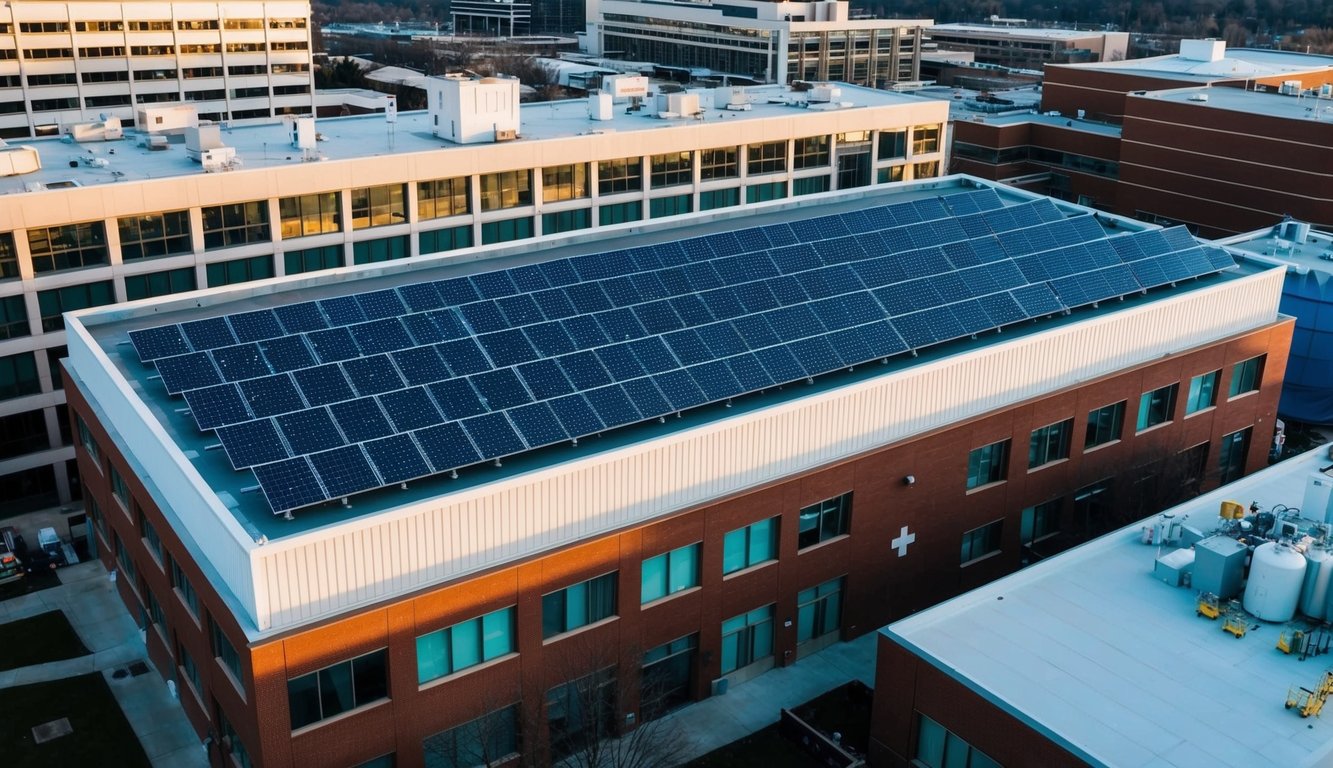
Solar panels offer significant financial benefits for healthcare facilities, balancing initial costs with long-term savings. Proper analysis of expenses, returns, and incentives is crucial for informed decision-making.
Initial Investment Considerations
The upfront costs for solar panel systems in healthcare settings include:
• Equipment: Panels, inverters, and mounting hardware
• Installation: Labour and site preparation
• Permitting: Local regulations and paperwork
System size impacts costs, with larger facilities requiring more extensive arrays. Prices vary based on panel quality and efficiency. High-efficiency panels cost more but may yield better returns in space-constrained areas.
A typical 100kW system for a small hospital might cost £80,000 to £120,000. Larger 500kW+ systems for major hospitals can exceed £500,000. These figures serve as rough estimates, as actual costs depend on specific site conditions and chosen components.
Long-term Savings Potential
Solar panels generate substantial savings over their 25-30 year lifespan. Healthcare facilities see reduced electricity bills immediately after installation. The NHS Northwick Park Hospital’s system generates up to 52,975 kWh annually, significantly lowering grid dependence.
Savings calculations should consider:
• Current electricity rates
• Projected energy price increases
• Facility’s energy consumption patterns
A medium-sized clinic might save £10,000-£15,000 yearly on electricity costs. Larger hospitals can see annual savings exceeding £100,000. These figures compound over time, often resulting in systems paying for themselves within 7-12 years.
Government Incentives And Rebates
The UK government offers various incentives to encourage solar adoption in healthcare:
- Smart Export Guarantee (SEG): Payments for excess energy fed back to the grid
- Capital Allowances: Tax deductions for energy-efficient equipment
- Grants: Occasional funding programmes for public sector energy projects
Local councils may provide additional support or streamlined permitting processes for healthcare solar installations. These incentives can significantly reduce payback periods and improve overall ROI.
Maintenance And Operating Costs
Solar systems for healthcare facilities have minimal ongoing costs. Annual maintenance typically includes:
• Panel cleaning: £100-£200 per cleaning
• Inverter checks: £150-£300 annually
• Monitoring system upkeep: £50-£100 per year
Most manufacturers offer 25-year warranties on panels and 10-year warranties on inverters. Budgeting for inverter replacement after 10-15 years is advisable, costing roughly 10% of the initial system price.
Overall, maintenance costs average 0.5-1% of the system’s initial cost per year. These expenses are far outweighed by the energy savings, ensuring a positive ROI for healthcare solar installations.
Implementation Strategies And Best Practices
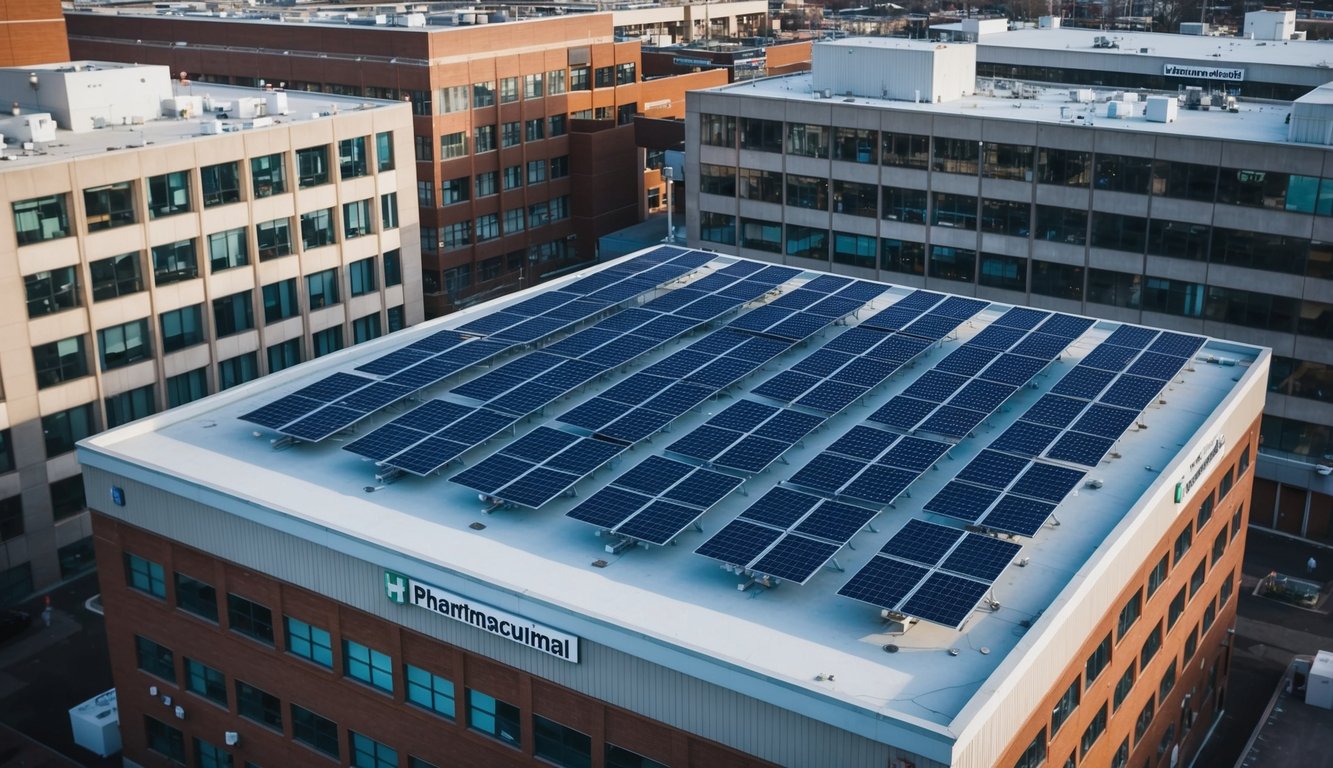
Effective implementation of solar panels in healthcare facilities requires careful planning, execution, and ongoing management. Proper strategies ensure optimal energy generation, cost savings, and enhanced operational efficiency for medical centres.
Planning And Assessment
Thorough planning is crucial for successful solar panel integration in healthcare settings. Begin with a comprehensive site assessment to determine the facility’s energy needs and potential for solar generation. This involves:
• Energy audit: Analyse current consumption patterns
• Roof evaluation: Assess structural integrity and available space
• Shading analysis: Identify potential obstructions to sunlight
Consider the facility’s future energy requirements and growth plans. Engage key stakeholders, including hospital administrators, facilities managers, and medical staff, to gather input and address concerns.
Develop a detailed project timeline and budget, accounting for potential disruptions to daily operations. Evaluate financing options, such as power purchase agreements or government incentives, to optimise the investment.
Installation Process
The installation of solar panels in healthcare facilities demands meticulous execution to minimise disruptions and ensure safety. Key steps include:
- Site preparation: Clear the designated area and reinforce the roof if necessary
- Equipment delivery: Coordinate logistics to avoid interfering with patient care
- Panel mounting: Install racking systems and secure panels
- Electrical work: Connect panels to inverters and the facility’s electrical system
- Safety measures: Implement fall protection and fire safety protocols
Schedule installation during periods of lower patient activity when possible. Establish clear communication channels between the installation team and hospital staff to address any issues promptly.
Ensure compliance with local building codes and healthcare-specific regulations throughout the process.
Staff Training Requirements
Proper training is essential for maximising the benefits of solar energy in healthcare settings. Develop a comprehensive training programme covering:
• System operation: Basic functionality and monitoring procedures
• Maintenance protocols: Routine checks and cleaning procedures
• Emergency procedures: Safety protocols and shutdown procedures
• Energy management: Optimising energy use and integrating with existing systems
Tailor training sessions to different staff roles, from facilities managers to medical personnel. Provide hands-on experience with the system interfaces and control panels.
Create easily accessible reference materials and designate key personnel as solar energy champions to support ongoing education and troubleshooting.
System Monitoring And Management
Continuous monitoring and proactive management are vital for maintaining optimal solar panel performance in healthcare facilities. Implement the following practices:
- Real-time monitoring: Install advanced monitoring systems to track energy production and consumption
- Performance analysis: Regularly review system output and efficiency metrics
- Preventive maintenance: Schedule routine inspections and cleaning to prevent issues
- Integration with facility systems: Synchronise solar energy use with other building management systems
Develop response protocols for system alerts or malfunctions, ensuring minimal impact on critical medical operations. Regularly update disaster preparedness plans to incorporate solar energy considerations.
Leverage data analytics to identify opportunities for further operational efficiency improvements and energy cost reductions.
Environmental Impact And Sustainability
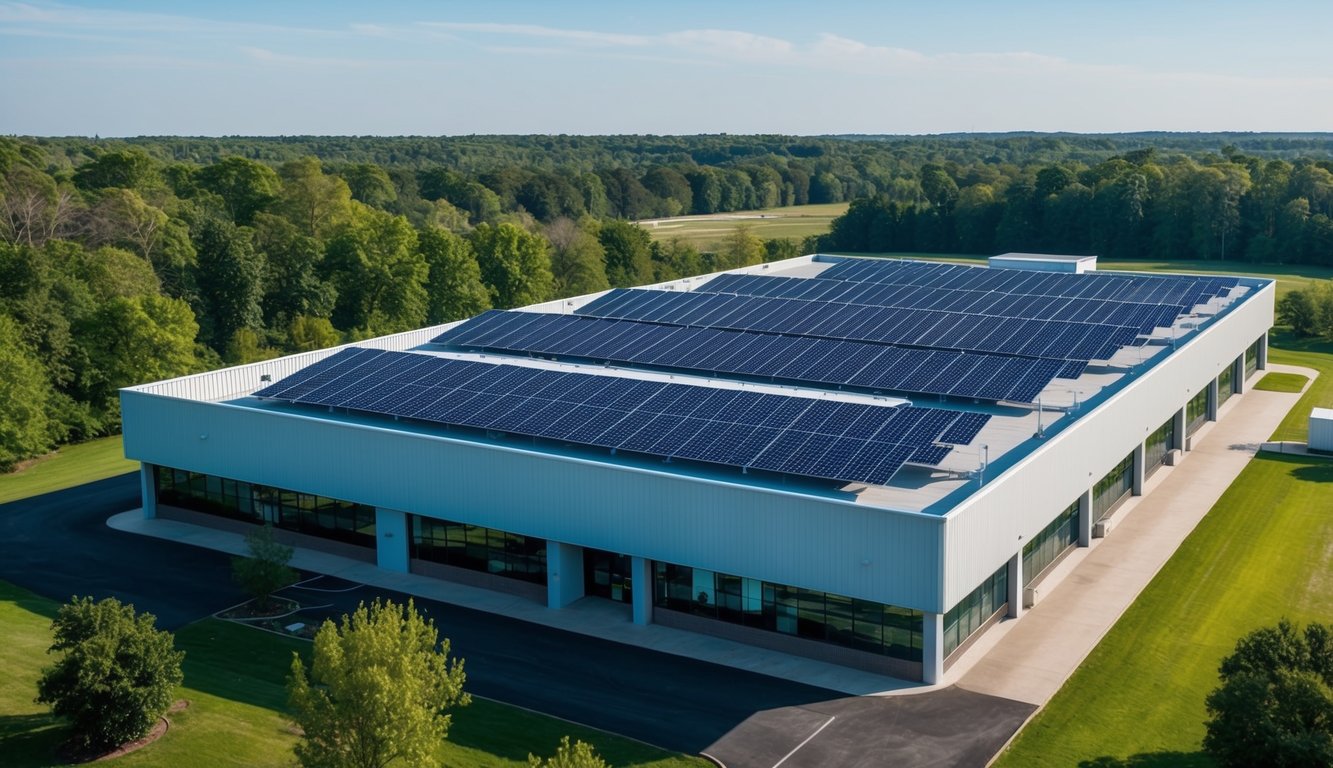
Solar panels for healthcare and pharmaceutical facilities offer significant benefits for reducing ecological footprints and promoting sustainability. These renewable energy solutions provide a path to greener operations and improved environmental stewardship.
Carbon Footprint Reduction
Solar energy systems dramatically decrease carbon emissions from healthcare and pharmaceutical operations. By harnessing the sun’s power, these facilities can substantially reduce reliance on fossil fuels. A typical 100kW solar array can offset approximately 70-100 tonnes of CO2 annually, equivalent to planting 1,500-2,000 trees.
Key benefits:
- Lower greenhouse gas emissions: Up to 80% reduction compared to grid electricity
- Reduced air pollution: Fewer particulates and other harmful emissions
- Energy independence: Less reliance on fossil fuel-based power sources
Solar installations also help mitigate the effects of climate change by reducing the need for carbon-intensive energy production. This aligns with global efforts to limit temperature increases and protect public health.
Waste Management Benefits
Solar energy systems contribute to improved waste management practices in healthcare and pharmaceutical settings. These installations produce clean electricity with minimal waste byproducts during operation.
Waste reduction advantages:
- No fuel waste: Solar panels require no fuel inputs, eliminating associated waste streams
- Long lifespan: 25-30 year panel lifespans reduce electronic waste
- Recyclable components: Many solar panel materials can be recycled at end-of-life
Additionally, solar power can support waste reduction initiatives by powering efficient waste processing equipment and energy-recovery systems. This creates a virtuous cycle of sustainability throughout facility operations.
Green Healthcare Certification
Adopting solar energy can help healthcare and pharmaceutical facilities achieve green building certifications. These recognitions demonstrate commitment to sustainability and can enhance reputation.
Common certifications include:
- LEED (Leadership in Energy and Environmental Design)
- BREEAM (Building Research Establishment Environmental Assessment Method)
- Green Globes
Solar installations contribute points towards these certifications by:
- Reducing energy consumption
- Lowering carbon emissions
- Promoting renewable energy use
Certified facilities often enjoy benefits like reduced operating costs, improved patient outcomes, and increased staff satisfaction. These advantages make solar power an attractive option for healthcare providers seeking to enhance their sustainability credentials.
Environmental Compliance
Solar energy helps healthcare and pharmaceutical facilities meet increasingly stringent environmental regulations. Many countries and regions are implementing stricter emissions targets and renewable energy mandates.
Compliance benefits:
- Emissions reductions: Meet or exceed carbon reduction requirements
- Renewable energy targets: Contribute to mandated clean energy quotas
- Energy efficiency standards: Improve overall facility energy performance
By proactively adopting solar power, healthcare and pharmaceutical organisations can stay ahead of regulatory changes. This forward-thinking approach ensures long-term compliance and demonstrates industry leadership in sustainable practices.
Future Trends and Innovations
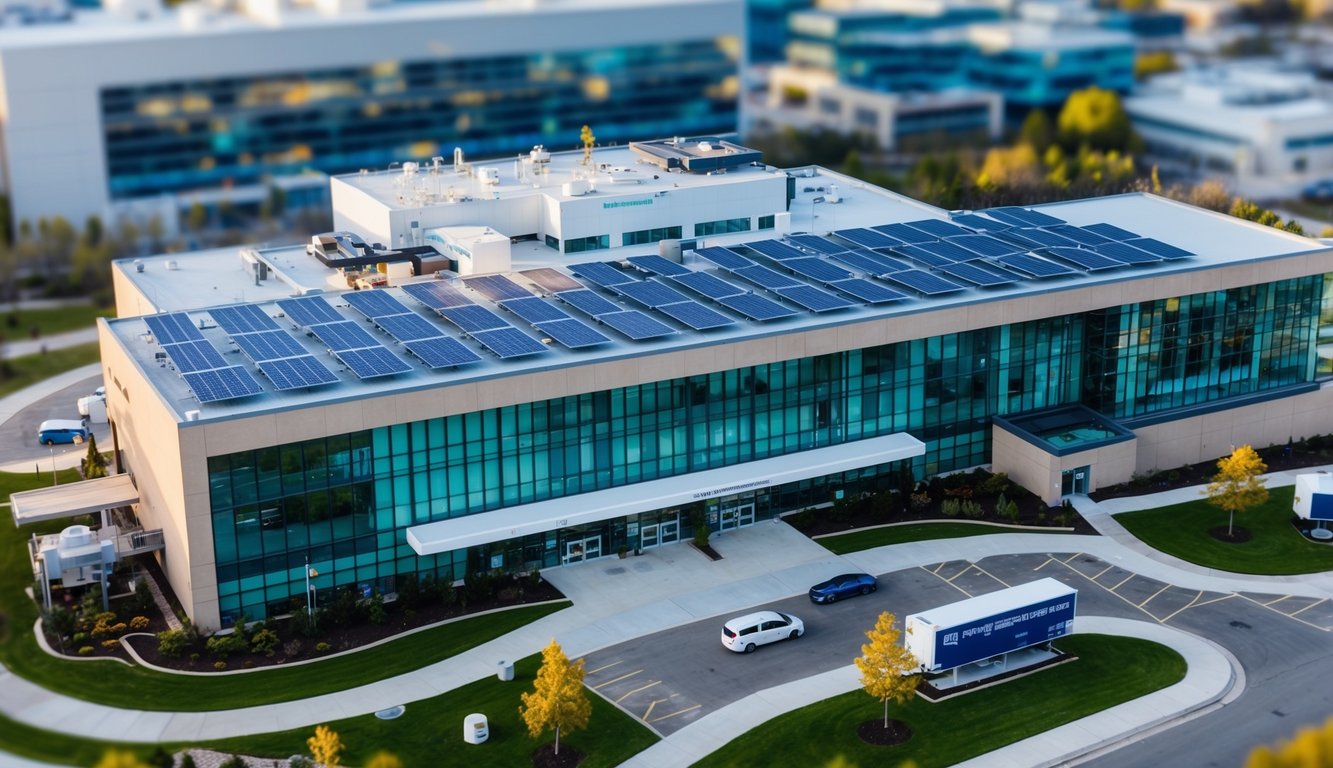
Solar technology in healthcare is rapidly advancing, offering exciting possibilities for medical facilities. These innovations promise improved efficiency, sustainability, and patient care.
Emerging Solar Technologies
Solar panels are becoming more efficient and versatile. Perovskite solar cells show great promise, with potential efficiencies exceeding 30%. These lightweight, flexible cells could be integrated into building materials, expanding solar usage in hospitals.
Bifacial panels capture sunlight from both sides, increasing energy production. This technology is particularly useful for rooftop installations on medical facilities.
Transparent solar cells may revolutionise window design in hospitals, generating electricity whilst allowing natural light to enter.
Quantum dot solar cells are another emerging technology. These nanoscale semiconductor particles could significantly boost panel efficiency, making solar more viable for energy-intensive medical equipment.
Integration With Smart Hospital Systems
Solar energy systems are increasingly interconnected with smart hospital infrastructure. Artificial intelligence optimises energy distribution, ensuring critical medical equipment receives priority power.
Smart grids allow hospitals to seamlessly switch between solar, battery, and grid power. This enhances reliability and reduces energy costs.
Internet of Things (IoT) devices monitor energy consumption, allowing facility managers to identify inefficiencies and optimise usage.
Solar-powered sensors can track environmental conditions, improving patient comfort and reducing energy waste.
Advanced Energy Storage Solutions
Innovations in energy storage are crucial for maximising solar potential in healthcare settings. Flow batteries offer long-duration storage capabilities, ideal for hospital backup power systems.
Solid-state batteries are becoming more prevalent, offering improved safety and energy density compared to traditional lithium-ion batteries.
Thermal energy storage systems can use excess solar energy to heat or cool water, reducing HVAC costs in large medical facilities.
Hydrogen fuel cells, paired with solar electrolysis, provide a promising long-term storage solution for hospitals aiming for grid independence.
Predictive Maintenance Systems
Advanced monitoring technologies are enhancing solar system reliability in healthcare settings. Machine learning algorithms analyse performance data to predict equipment failures before they occur.
Drone-based thermal imaging detects hotspots and potential faults in large-scale hospital solar arrays.
Self-cleaning nanotechnology coatings are being developed to reduce dust accumulation on panels, maintaining efficiency and reducing maintenance needs.
Automated robotic cleaning systems offer a labour-saving solution for keeping hospital solar installations at peak performance.
Conclusion
Solar panels offer significant advantages for healthcare and pharmaceutical facilities. You can reduce operational costs and enhance sustainability by implementing solar energy solutions. These systems provide reliable power for critical medical equipment and contribute to a cleaner environment.
Healthcare institutions benefit from increased energy independence and reduced carbon footprints. Solar technology aligns with the sector’s commitment to public health and well-being. As panel efficiency improves and costs decrease, adopting solar becomes more viable for medical centres of all sizes.
Challenges remain, such as limited installation space in urban areas. Yet, innovative solutions like carport solar arrays and building-integrated photovoltaics are addressing these issues. The long-term savings and positive environmental impact make solar an attractive option for forward-thinking healthcare providers.
Solar energy in healthcare represents a convergence of technology and social responsibility. It supports both operational efficiency and broader public health goals. As the healthcare sector continues to evolve, solar power will likely play an increasingly vital role in powering medical facilities and pharmaceutical operations.
The future of healthcare looks brighter with solar energy. You can expect to see more hospitals, clinics, and research facilities harnessing the sun’s power in the coming years. This shift promises a healthier planet and more resilient healthcare systems for communities worldwide.
Frequently Asked Questions
Solar panels offer numerous benefits for healthcare and pharmaceutical facilities. Let’s address some common queries about implementing this technology in these sectors.
What are the optimal solar panel options for healthcare and pharmaceutical facilities?
Monocrystalline solar panels are often the best choice for healthcare and pharmaceutical facilities. These panels offer high efficiency and performance, making them ideal for maximising energy production in limited roof space. Thin-film panels can be a good alternative for buildings with weight restrictions or unusual roof shapes.
How much can healthcare and pharmaceutical organisations typically expect to invest in solar panel installations?
The cost of solar panel installations for healthcare and pharmaceutical organisations varies widely based on factors such as facility size and energy needs. On average, a 50kW system suitable for a medium-sized facility might cost between £40,000 and £60,000. Larger installations can range from £100,000 to £500,000 or more.
Is it possible for healthcare and pharmaceutical businesses to deduct solar panel expenses as a corporate tax expense?
Yes, healthcare and pharmaceutical businesses can often deduct solar panel expenses as a corporate tax expense. The UK government offers tax incentives for businesses investing in renewable energy. You may be able to claim capital allowances on solar panel installations, potentially reducing your tax bill.
What major risks should healthcare and pharmaceutical companies consider when implementing solar technology?
When implementing solar technology, healthcare and pharmaceutical companies should consider:
- Disruption to operations during installation
- Potential roof damage if not properly installed
- Maintenance requirements and associated costs
- Cybersecurity risks if the system is connected to the facility’s network
What are the requirements for healthcare and pharmaceutical establishments to obtain subsidised solar panel systems in the UK?
To obtain subsidised solar panel systems in the UK, healthcare and pharmaceutical establishments must:
- Be a registered business or organisation
- Own the building or have landlord permission for installation
- Use an MCS-certified installer
- Meet specific energy efficiency requirements
How does solar panel adoption impact operational resilience in the healthcare and pharmaceutical sectors?
Solar panel adoption enhances operational resilience in healthcare and pharmaceutical sectors by:
- Reducing dependence on the national grid
- Providing a backup power source during outages
- Stabilising energy costs over the long term
- Ensuring consistent power supply for critical equipment and processes
This increased energy independence can be particularly valuable for facilities that require uninterrupted power for sensitive operations or emergency services.

